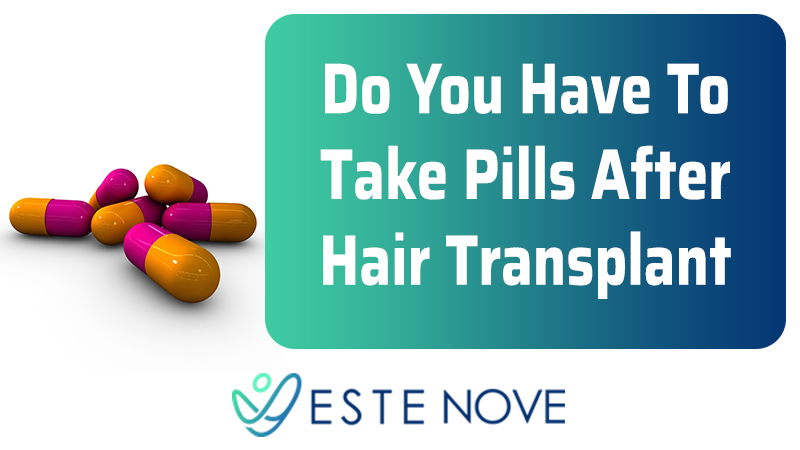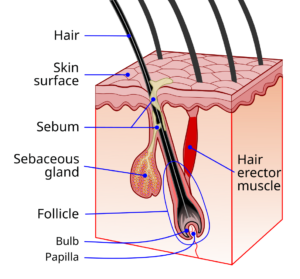
Do You Have To Take Pills After Hair Transplant? Every day, hundreds of people have a hair transplant operation, but there is still some confusion about medications after the procedure. If you have done hair restoration or wish to prefer to do, you might have similar questions on your mind. What should we do after the surgery, or do you have to take pills after a hair transplant? Don’t worry! Your questions will be answered in this article.
Hair transplant, or hair restoration, is a very significant surgery performed at the right clinic or hospital by talented and expert doctors. Many people think that hair transplantation consists of a single part. Unfortunately not. We can separate the hair restoration into two parts. The first one is the surgery by high technological equipment, and the second one is the recovery time. Taking correct pills after the hair transplant is one of the most critical factors in this part for the best results.
The recovery process after hair transplant procedure;
- You can start to wash your hair after the fifth or sixth day of the surgery.
- You may see swelling in your head or face for the first days, but don’t need to be panic because it is commonly seen this.
- According to most surgeons, you shouldn’t smoke and drink for at least one month after the surgery. If you do, the risk of the complications will most probably increase.
- Your new hair follicles for the first weeks after the surgery will be more sensitive. Don’t touch your head, and protect it against impacts.
- Don’t scratch your head. To solve the problem, you can spray saline water untouched by your hands
- You should take your doctor’s advice before the first wash after the surgery.
- You should take your medication at the right time with the correct amount.
- Don’t use hair dryers the first weeks after the surgery.
- Comb your hair carefully and gently.
- You should ask your doctor when you can cut, dye, or curl your hair after the surgery.
- Sleeping position is a significant factor. A sleeping flat can lead to swelling or damage to the new follicles. For this reason, you have to be more careful more than ever for the first nights after the procedure.
You have to take pills after the hair transplant operation. Generally, your doctor will most probably recommend taking some antibiotics or antibacterial cream, to prevent any complications, such as Minoxidil or Finasteride. So, what are these, and how do they work?
Types of Medications / Pills
Pills you have to use after a hair transplant may vary, but you should regularly use it to improve your recovery process.
Minoxidil:
It is a topical medication prescribed for a person who suffers from baldness and excess hair shedding problems. It restores the patient’s hair follicles and engagement with new hair growth. Don’t forget that the results depend on the person; it may not be the right medication for everyone. For this reason, you mustn’t take Minoxidil without your dermatologist’s permission.
Finasteride:
There are two different forms; oral or topical. It provides hair regrowth in people, especially men. It helps to bring under control the production of DHT hormone; the DHT hormone is the main reason in hair shedding. Therefore, hair loss can be stopped or made less.
Generally, almost two weeks after hair transplant, the patients can start taking Minoxidil and Finasteride. You can use Minoxidil on your scalp to help hair growth after two weeks of hair transplant. Besides, you can start to take also Finasteride after two weeks of hair restoration. It will support the growth of transplanted hair follicles. These two medications can be advised to use together case by case. So, they stop hair shedding and provide a small amount of new hair growth. The result of the medication treatment can be seen 3 or 4 months later.
Anti-Swelling Tablets:
Swelling of the scalp after the surgery is commonly seen. It is entirely normal, and you don’t have to worry. It can happen due o fluid retention or inflammation and show that your body is recovering.
Antibiotics:
Rarely, after the hair transplant, an infection may be seen, and the surgeons can give antibiotics to prevent that the patient doesn’t develop any infection. However, it depends on the patient and shouldn’t be used by individuals.
Painkillers:
The surgeon prefer local anesthesia in hair transplant, so the patients don’t feel any pain during the procedure, but then they may feel. The surgeon can give painkiller tablets, and the patients have to take the pills regularly after a hair transplant.
Shampoo, hair cream, and lotion:
You can change your wash routine using special shampoo temporarily. It helps moisturize the skin and soften the cabs in the head. You have to be very careful about avoiding rubbing your hair. Besides, you shouldn’t take a shower with hot or cold water using pressure.
Anti-Inflammatory medicines:
Inflammation may be seen after the surgery due to the immune system’s response against bacteria. The body can perceive the incisions in the head as injury, and inflammation can happen. So, the patient feels pain or swelling. Anti-Inflammatory medicines help to overcome these symptoms.
Vitamins/ Supplements:
Vitamins and supplements help to strengthen the immune system and repair damaged cells. They are not necessary but can help. If the patients suffer from mineral or vitamin deficiency, they can consult their doctor about vitamin and supplements. According to some doctors, it isn’t compulsory to consume vitamins and supplements before the procedure.
Hair transplant operation helps many people who wish to obtain permanent solutions for their hair shedding problem. After the surgery, you should follow the instructions given by your doctor and take prescription drugs at the right time. These offer a shorter recovery process for you. After a hair transplant, you have to take pills, such as Minoxidil and Finasteride, because it will help you take the best result. Also, you can use multivitamin tablets, dietary supplements. These can help you to get more strength in the growth of transplanted hair.



